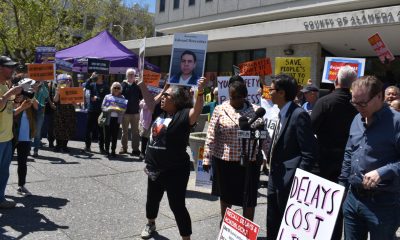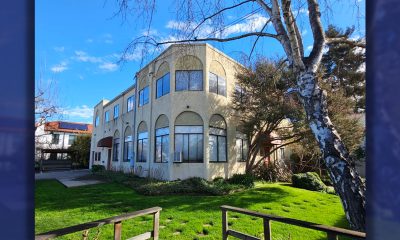#NNPA BlackPress
Collecting Data on the Well-Being of African Americans
By Lois Elfman diverseeducation.com In “Black Thriving in America: 2023,” data is presented detailing the experiences of Black Americans when shopping, dining out, in healthcare settings, at work, with schools, with police and more. The findings are presented in a dashboard, which will serve as a benchmark. The Payne Center for Social Justice, which is […]
The post Collecting Data on the Well-Being of African Americans first appeared on BlackPressUSA.

By Lois Elfman
diverseeducation.com
In “Black Thriving in America: 2023,” data is presented detailing the experiences of Black Americans when shopping, dining out, in healthcare settings, at work, with schools, with police and more.
The findings are presented in a dashboard, which will serve as a benchmark. The Payne Center for Social Justice, which is part of the Thurgood Marshall College Fund, has committed to conducting the survey with the same questions and publishing the data annually for the next 100 years.
“It becomes an annual dashboard and snapshot of the state of Black life in America as self-reported,” said Dr. M. C. Brown II, executive director and research scientist of the Payne Center for Social Justice. He said it was essential to establish data and quantify areas related to social justice issues. Gallup conducted the study. Brown noted that it reflects 40 million Black Americans.
The Five Pillars of Wellbeing are career, community, social, physical and financial. Behind each of the indexes are sub-questions. While 60 percent of Black Americans are thriving in the social interactions and 53 percent in their careers, less than half report thriving in their community, physical and financial circumstances.
Overall, 52 percent of Black Americans are thriving and living “best life imaginable,” which matches white Americans, but the rate masks disparities across key areas of Black life experiences.
“When you unpack each of the four areas of inquiry (dignity in public, respect at work, police and me, and safety in neighborhood), there were significant differences in Black life experiences and other people’s experiences in this country, but they did not perceive them with the same levels of negativity that they were actually experiencing,” said Brown, who formerly served as president of Kentucky State University and Alcorn State University. “While we should acknowledge the 52 percent thriving is progress, it also fails to account for the fact that 48 percent of Black Americans report that they are struggling or suffering in this nation.”
Interactions With Police
An example Brown cites is interactions with police. 26 percent of respondents, who were polled in February 2023, reported personally having an interaction with police over the previous 12 months. The national average is 29 percent. The percentage became lower when income increased.
Black respondents with income under $48,000 per year reported 29 percent, while Black respondents with income $120,000 or higher reported 23 percent. Of those who had an interaction, 71 percent of Black Americans reported they are less likely to say they were treated fairly in the interaction as opposed to 90 percent of white individuals.
Dr. Keith Taylor an adjunct assistant professor at John Jay College of Criminal Justice and a veteran of the New York Police Department, teaches several courses for future police officers in Law of Police Science and Criminal Justice Administration. Those courses include engaging multi-cultural and multi-ethnic communities, introduction to policing and police in urban communities. He also teaches in the Africana Studies department.
“You have to look at what type of policing is being conducted,” said Taylor. “Often, Black neighborhoods—especially the poor or working class neighborhoods—are the ones usually targeted for anti-crime measures. … That would then lead to African Americans having a high level of dissatisfaction with their encounters with police.
In areas where policing is not based on enforcement but includes community policing involving creative types of ways of engaging communities to address problems as opposed to seeing arrests as the primary function of police, you tend to have a greater satisfaction of the relationship with police.”
Nuances Of Existence
Taylor said the Payne report brings attention to the nuances of existence that African Americans have and can generate research around potential solutions to disparities.
Only 42 percent of Black Americans said they were treated with respect at work versus 46 percent of white Americans. 56 percent of Black Americans said they felt safe walking alone at night in the neighborhood where they lived, versus 77 percent of white Americans. Brown said this data provides researchers with a concrete foundation for further inquiry.
“We were purposeful and intentional not to interpret the data and just to present the data,” Brown said. “By us not giving the narrative, it leaves it open for everyone.”
Taylor said he wished the report offered some historical context, such as how redlining impacted voting patterns and access to education. “You can ask somebody if they’re getting respected or how the police are treating them or do they feel safe in their neighborhood, but without understanding the very real complexities that they are having to deal with, the disparities that exist in their lives and in past generations…you’re missing a piece,” Taylor said.
Going forward, as there is new data the Payne Center for Social Justice will engage with policy makers about the issues.
“Our hope is that every politician, every Presidential candidate will look at where these numbers are for the country and we’ll hold them accountable to move these numbers forward in a positive way, and that cities and states will ultimately adopt them as well and we’ll be asking them to move the needle in each of their communities,” said Brown.
This article originally appeared in The Birmingham Times.
The post Collecting Data on the Well-Being of African Americans first appeared on BlackPressUSA.
#NNPA BlackPress
LIVE! — ASK ALMA — TUES. 5.30.23 7PM EST
This week, guest host Leah Farmer King and her panel share tips and advice to reader mail. Leah and the panel, along with the …
The post LIVE! — ASK ALMA — TUES. 5.30.23 7PM EST first appeared on BlackPressUSA.

This week, guest host Leah Farmer King and her panel share tips and advice to reader mail. Leah and the panel, along with the …
The post LIVE! — ASK ALMA — TUES. 5.30.23 7PM EST first appeared on BlackPressUSA.
#NNPA BlackPress
LIVE! — ASK ALMA! — TUES. 1.9.24 7 PM EST
HAPPY NEW YEAR! Welcome back for our first show of the year! This week, Alma and her panel answer viewer mail. As always …
The post LIVE! — ASK ALMA! — TUES. 1.9.24 7 PM EST first appeared on BlackPressUSA.

HAPPY NEW YEAR! Welcome back for our first show of the year! This week, Alma and her panel answer viewer mail. As always …
The post LIVE! — ASK ALMA! — TUES. 1.9.24 7 PM EST first appeared on BlackPressUSA.
#NNPA BlackPress
LIVE! — ASK ALMA! — TUES. 1.30.24 7PM EST
Think you’re the only one with problems? Each week, NNPA advice columnist Alma Gill, along with her panel of guest advisors …
The post LIVE! — ASK ALMA! — TUES. 1.30.24 7PM EST first appeared on BlackPressUSA.

Think you’re the only one with problems? Each week, NNPA advice columnist Alma Gill, along with her panel of guest advisors …
The post LIVE! — ASK ALMA! — TUES. 1.30.24 7PM EST first appeared on BlackPressUSA.
-

 Community3 weeks ago
Community3 weeks agoFinancial Assistance Bill for Descendants of Enslaved Persons to Help Them Purchase, Own, or Maintain a Home
-

 City Government6 days ago
City Government6 days agoCourt Throws Out Law That Allowed Californians to Build Duplexes, Triplexes and RDUs on Their Properties
-

 Activism2 weeks ago
Activism2 weeks agoOakland Post: Week of April 24 – 30, 2024
-

 Business3 weeks ago
Business3 weeks agoV.P. Kamala Harris: Americans With Criminal Records Will Soon Be Eligible for SBA Loans
-

 Activism4 weeks ago
Activism4 weeks agoOakland Post: Week of April 10 – 16, 2024
-

 Community3 weeks ago
Community3 weeks agoAG Bonta Says Oakland School Leaders Should Comply with State Laws to Avoid ‘Disparate Harm’ When Closing or Merging Schools
-

 Community3 weeks ago
Community3 weeks agoRichmond Nonprofit Helps Ex-Felons Get Back on Their Feet
-

 Community3 weeks ago
Community3 weeks agoOakland WNBA Player to be Inducted Into Hall of Fame
















































